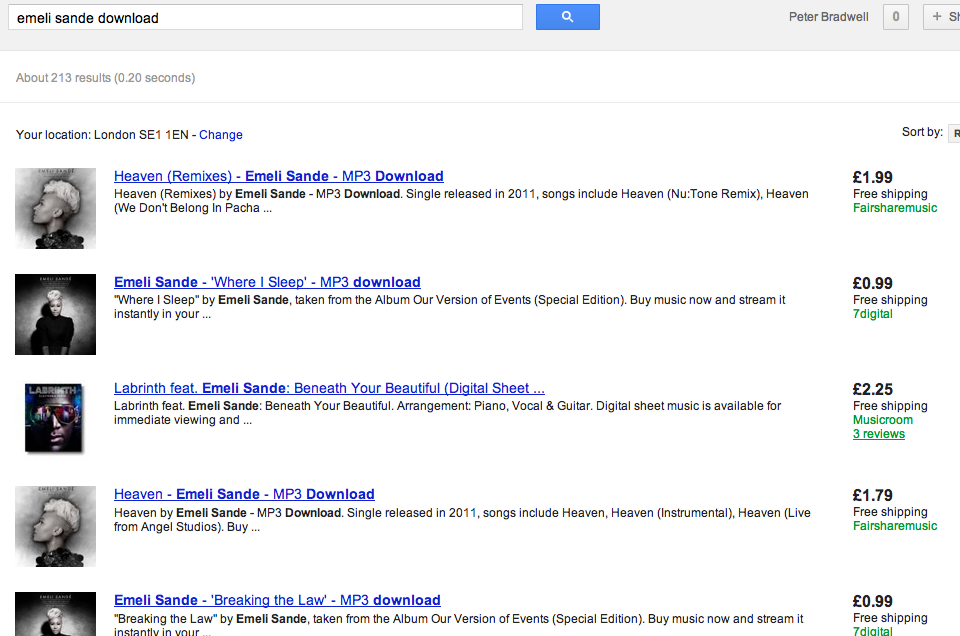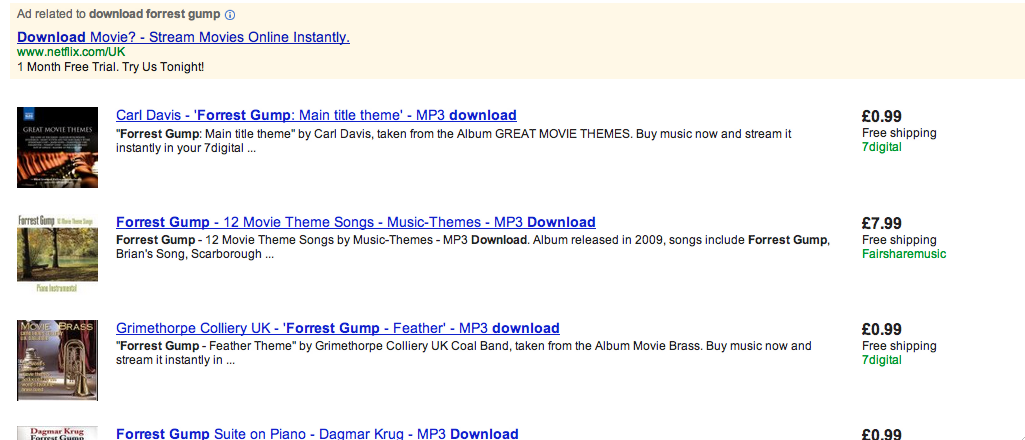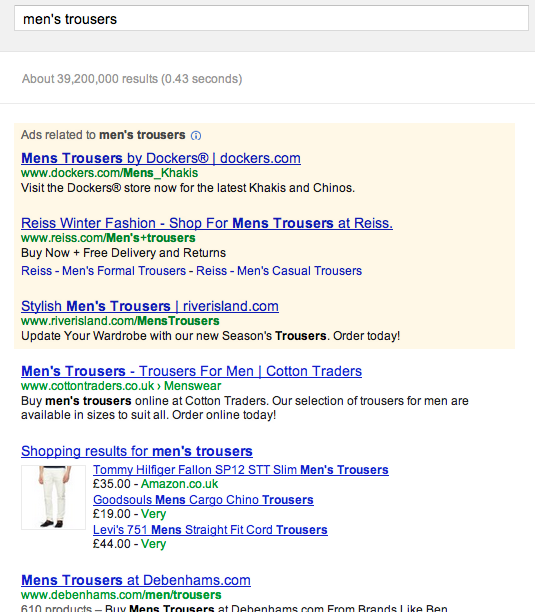Google shopping and legal markets for digital goods
Something has always confused me about the market for digital goods online. If you search for, for example, “Emili Sande download”, why don’t more legal results turn up in the ‘Shopping’ section? (If anybody knows the answer or can explain, let us know in the comments section).
I’m not talking about the ‘web’ results – but the specific set of results listed under shopping. If I’ve been looking correctly, I only seem to ever see 7Digital and Fairsharemusic, and sometimes Sainsbury’s Entertainment or Shop.To. Other than that, the results tend to be for CDs. But there are plenty more legal digital services around, and I don’t see them. You get lots of shopping results if you search for something like ‘men’s trousers’ – and a select few of those results also tend to show up as a small subsection of the general web search results.
Here’s what happens when you search Google shopping for ‘Emili Sande download”:

And for a film, like ‘Forrest Gump download”:

(Note: I subscribe to Netflix and I don’t think Forrest Gump is in its repertoire). This seems crazy. I’ve not really even heard this talked about.
It’s interesting to note that in the US, Google Shopping is now a paid for service – businesses are only listed if they are part of the ads scheme. This isn’t yet the case in the UK.
The following is complete speculation, but here are a few thoughts about why getting more legal digital services into Google shopping doesn’t seem to be on the table:
- Google: They have their own music service, Google Play. A well functioning shopping section is basically a way of advertising competitors to that. But results for Google Play don’t even turn up in the shopping results. They may also have plans to launch Google shopping as a paid for service in the UK too. So bringing this to the table now may undermine the opportunity to sell space in there, or could heighten pressure to do something about normal web search results now.
- Copyright owners: First, they may prefer people didn’t discover music through Google, or any search engine; fully curated services they exert some more control over may be more appealing, for example. Second, they may have spotted that Shopping has become a paid for service in the US – and by demanding legal services are boosted in the normal web results now, perhaps they’ve seen an opportunity for a free leg up before that happens.
This may be way off the mark. Perhaps it’s technically difficult. Perhpas there’s a banal explanation, like they haven’t thought of it before. This may all be a terrible idea for a reason I haven’t thought of. I don’t know.
But it seems like a decent deal all round – Google provides searches for determined consumers in large volumes; copyright owners want those results, and for people to be directed to legal content; consumers will likely be accustomed to using ‘shopping’ as a way of finding what they want to buy. And there are quite a few legal services that could populate the list of online stores. An overview of shopping results also tend to appear pretty high up in the general web search results – which would be good news for copyright owners as they tend to worry that the first results given by search engines are to unlicensed sites. To go back to the ‘men’s trousers’ example, the ‘shopping’ results appear second:

Also, Ofcom’s new research into copyright infingement, published yesterday, found that around 44% of responders weren’t sure what’s legal online. This would, you assume, help with that.
As an added bonus, on top of these benefits, we avoid the tricky question about who is allowed to interfere in the rankings general web search results – which is what the trade associations involved in current policy discussions with government are demanding.
But I don’t believe this has been dicussed in these ongoing DCMS roundtables (which are supposed to be focused on sorting out online copyright). DCMS are running a series of roundtables in which trade associations seem to have been given free reign to demand action from online service providers, with apparently no account of due process, in the name of ‘getting things done’. More analysis of what’s happening in those roundtables soon. You can see the minutes of the latest meeting here and DCMS have a page on what they’re doing on copyright here.
At the moment, the consumer is left with things like ‘The Content Map’, a new website created by copyright owners that lists services where people can find legal digital content. There’s not a whole lot to be said for it, other than ‘it’s a start’. Although I do predict that ‘Just Content Map it’ won’t be something people are saying as a replacement for ‘look for it online’ any time soon.
